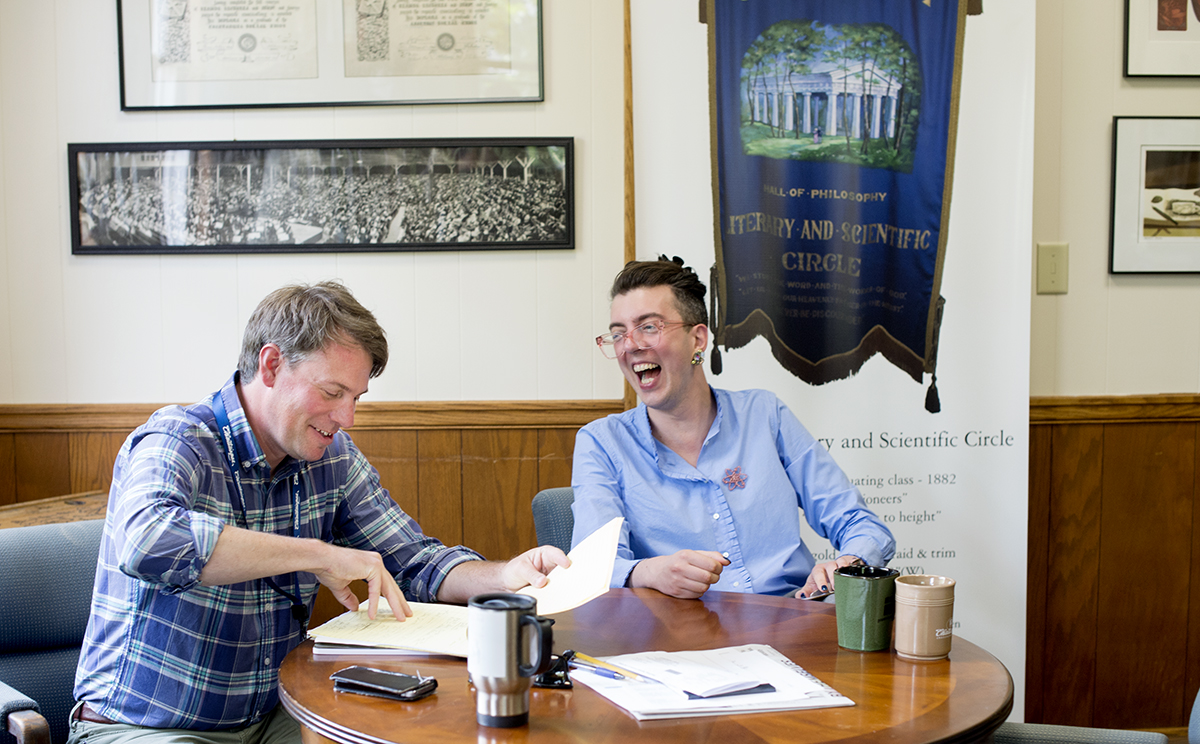With the retirement of Sherra Babcock, vice president and Emily and Richard Smucker Chair for Education, President Michael E. Hill realized he had a major vacancy to fill.
Hill said he knew when he started his tenure as president that Babcock would be retiring at the end of the 2017 season. He also knew the range of programming she managed in her role represented a “significant portfolio.”
That “significant portfolio” is a lot for one person to handle, so a decision was made to split up those responsibilities across different positions. The position of vice president and Emily and Richard Smucker Chair for Education will remain, but will now be supported by a new position: director of literary arts.
In September, David Griffith will begin his tenure as vice president and Emily and Richard Smucker Chair for Education, and Atom Atkinson will begin their tenure as director of literary arts.
Griffith’s hiring was officially announced at the beginning of June. He previously worked at the Interlochen Center for the Arts in Interlochen, Michigan, where he served as director of creative writing. He is the author of A Good War is Hard to Find: The Art of Violence in America and is finishing his second book, Pyramid Scheme: Making Art and Being Broke in America.
“He has absolutely the right experience,” Babcock said. “His experience with young people — which will be a focus of his work here — and his experience in the literary arts are great. I know that the work that I’ve done is going to be carried on. It’s going to be different, and I’m very excited by that. I can’t wait to see the progress and what Dave is going to accomplish.”
Babcock said that Griffith’s past work in education, including at Sweet Briar College, makes him a perfect fit for his new role at Chautauqua.
“I don’t think we could’ve found anyone who is more dedicated to growing Chautauqua through the education pillar,” Babcock said.
Atkinson’s hiring was announced at the end of June. Atkinson also worked at Interlochen as a creative writing instructor during Griffith’s tenure. They have also served as an instructor in various writing programs across the United States.
The splitting of Babcock’s responsibilities across several positions and departments (additionally, Matt Ewalt, currently associate director of education and youth services, will assume the role of chief of staff and oversee the 10:45 a.m. lecture platform from Hill’s office) is meant to better serve Chautauqua’s various communities. Hill said as he and Babcock figured out what Chautauqua Institution would look like after her retirement, Babcock showed him “an incredible thoughtfulness about why people show up the way they show up and how we can think better and differently about serving folks that come to the Institution.”
Babcock said Atkinson is “a breath of fresh air.” She said she was impressed by Atkinson’s literary background, and that their past work experiences show a deep appreciation for literature, writing and teaching.
“Under their leadership, I think we’re going to see a blossoming of the Writers’ Center and its offerings, and a difference in the CLSC programming,” Babcock said.
It’s something Babcock has seen in her own time planning programming within the Chautauqua Literary and Scientific Circle, she said. Chautauquans have told her they can see how her literary tastes have differed from those before her, Babcock said, and she expects the same will be true for Atkinson.
“Atom’s enthusiasm for the written word is just contagious,” Babcock said.
To prepare for their new roles, Griffith and Atkinson visited the grounds during Weeks Six through Eight of this season so they could shadow Babcock and see what their jobs will entail.
Griffith said it was a good way to be exposed to the community.
“You can’t walk across the grounds without someone coming up to you and presenting you with a question or presenting you with an issue, and I love that openness about Chautauqua,” Griffith said. “I look forward to having those conversations because that’s how progress happens.”
Griffith said his and Atkinson’s familiarity with each other means that he knows he has someone he can trust working alongside him — and someone who can call him out when he’s wrong or has a blind spot. They worked at Interlochen together for two years. Griffith said he would have been happy to work alongside whoever ended up with the literary arts director position, but he was thrilled to see Atkinson get the job.
Griffith said he was happy when the Institution’s search committee “came to the same exact conclusion” that he did regarding Atkinson being the right fit.
One problem Griffith said he knows they’ll have to figure out together will be acknowledging that not everything that worked at Interlochen will work at Chautauqua.
Atkinson agreed.
“I don’t know if it’s a drawback so much as a thing to keep in mind — that not everything is portable,” Atkinson said. “There will certainly be ways where we’ll both be challenged at the same time to see how something has to change to work differently because we’re serving a different community now.”
In his role, Griffith will oversee youth programs, Special Studies, the Smith Memorial Library and the Chautauqua Archives. He’ll also coordinate with Atkinson on literary arts programming.
Griffith said he’s interested in figuring out ways for the Institution to provide more opportunities for young people, particularly students who fall between the ages for Boys’ and Girls’ Club an college.
“I hope we’ll be able to put together an exciting slate of programming for a lot of different kinds of people who haven’t been served in the past,” Griffith said.
Part of that is thinking about how Club can serve as a conduit for the four pillars of the Institution: arts, education, recreation and religion, Griffith said. Club has a strong tradition to build on, he said, but he also wants to find ways to make it more exciting and dynamic.
That thinking extends to how Griffith sees Chautauqua’s overall mission: a place with a strong tradition, as well as a capacity for growth and evolution.
“We just have to capitalize on that and continue emphasizing the priorities of Chautauqua and finding people out there in the world — and this is really important to me — who would not have thought of Chautauqua as an ally before, who would not have thought of Chautauqua as a place they could come to have the conversations they’ve been having in their communities,” Griffith said. “That’s going to be the power of Chautauqua going forward.”
Atkinson will oversee Chautauqua’s literary arts programming, which includes the CLSC, The Chautauqua Prize, the Chautauqua Writers’ Center and the Chautauqua Writers’ Festival.
There are three pieces Atkinson said they want to keep in mind “at every stage and with every decision”: Chautauqua’s founding principles and mission, the history of the literary arts at Chautauqua, and making the literary arts both “a clarifying force and a messenger of what Chautauqua’s all about.”
“Those are three things I’m going to try and make live in every single thing that happens in the foreseeable future — every single decision, every single change,” Atkinson said.
Atkinson said they’ve been able to see how Babcock has elevated the literary arts during her tenure, and they want to continue that tradition. Part of that is thinking about how the literary arts programming can have a “finger on the pulse,” as well as bringing in authors who can foster conversations where new knowledge is being built, Atkinson said.
“I’m excited to see just how meaningful it can be for the literary arts to have national significance and be part of the national conversation,” Atkinson said. “How meaningful could it be for that to actually happen, and for it to be coming from Chautauqua, and not someplace else?”
Both Atkinson and Griffith said they’re excited by the challenges that have been set as they get ready to take on their new roles.
“I think I’m most excited about being part of a team of people who have been given a very clear mission by President Hill — that Chautauqua is a place that needs to lead,” Griffith said. “Chautauqua needs to be a leader at this moment in history. It feels very urgent that Chautauqua should rise to the challenge, as it has done in other eras of turmoil.”





